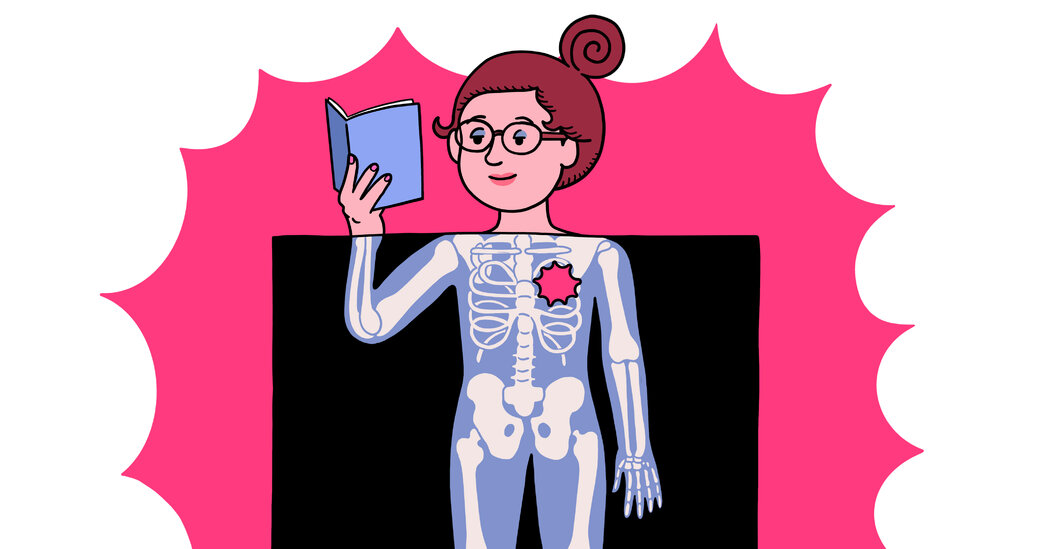Sometimes when you’re a teenager, you have to plan make-out spots around accessible public bathrooms. At least I did. As a kid with interstitial cystitis, I longed for books that reflected the experience of navigating high school with the added complication of an embarrassing, long-term condition. Where was my sassy heroine with a head full of plans and a bladder full of sores? And what about my friends with I.B.S., endometriosis and chronic fatigue? Don’t they deserve representation, too?
Fortunately, we’re starting to see more stories like these in mainstream publishing. Here are six Y.A. novels that authentically depict what it’s like to be a teenager with a chronic illness.
Sage, a high school volleyball star, is almost guaranteed a spot playing for her dream college after graduation, but a silent, genetic heart condition threatens to ruin everything. Then she meets Len, a junior who’s terrified that her thoughts and actions have the power to influence the destiny of the people she loves. The girls’ interwoven stories show the impact that socioeconomic status, family structures and community expectations have on how someone is able to get emotional support for a disability. This book is a must-read for anyone who is not sure what to say to, or how to help, someone grappling with a diagnosis.
This stunning novel in verse tackles what it’s like to live with stomach problems. The premise is simple: Two teenage strangers stuck in the same hospital room go through treatment for Crohn’s disease. This story is real, painful and hilarious, and the author draws on her own life to create vibrant characters and impart helpful, often profane, advice. This one will particularly speak to anyone who’s ever been hospitalized.
Deenie, by Judy Blume
“Deenie,” a novel about a teenager with scoliosis, was first published in 1973, but the book’s portrayal of feeling betrayed by your own body is just as relevant now as it was 50 years ago. Blume has said that with “Deenie,” she wanted to explore the relationship between a teenager who’s coming to terms with the impact of a diagnosis and a parent who’s dramatically mourning the person her daughter could’ve been. This dynamic makes 13-year-old Deenie’s eventual acceptance of her body, and her decision to honor its needs, feel like a real triumph.
The protagonist of this novel is Verónica, a high school senior with hip dysplasia. The painful condition holds her back on land, but she shines in water as an accomplished swimmer. She dreams of someday performing with the mermaid troupe at the lovably kitschy theme park in her Florida town, much to the chagrin of her Peruvian parents. When the theme park announces a mermaid audition, Verónica has to figure out what kinds of pain she can live with, both physically and emotionally. In this book, Sylvester beautifully illustrates the parallels of sexual and medical objectification, of being seen only as a collection of parts and not as a human being. As the story progresses, Verónica realizes that owning her body means being in control of decisions regarding how she cares for it, challenges it and shares it.
Cursed, by Karol Ruth Silverstein
At the beginning of “Cursed,” the protagonist, Ricky Bloom, declares that “pretty much no one gives a crap” about her disease. Overwhelmed by her diagnosis of juvenile arthritis, she has been skipping school in secret, but to avoid accruing so many absences that she’ll have to repeat ninth grade, she has to go back and face the unsympathetic administrators and asinine bullies waiting for her. Foulmouthed and fractious, Ricky is a pro at building protective emotional walls, but can she learn to love the vulnerable, hurting parts of herself that she tries so hard to hide? This book really highlights the role of advocacy and accommodations in improving someone’s life.
A single tick bite completely derailed Priya’s freshman year at Stanford. Suddenly she’s home recovering from Lyme disease while taking comfort in an online chronic illness support group. But when a fellow member, Brigid, stops responding to messages, Priya steals the family car and crosses state lines to make sure she’s OK. Upon her arrival, however, Priya realizes the mysterious monthly illness Brigid told the group about is more complicated than she let on: Brigid is a werewolf. “Lycanthropy and Other Chronic Illnesses” is a funny, heartfelt book with a phenomenal premise, and it manages to represent a lot of identities and intersectionalities: trans and disabled, chronically ill and racial minority, queer and cryptid. At its core, the novel feels like a love letter to the internet communities that connect people; it’s a reminder that friendships, both virtual and in-person, can save lives.


